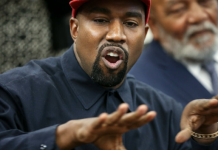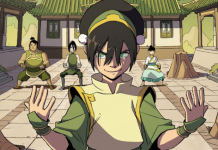Most performers who combine acting with a musical career tend to make it clear that they love both equally. But not Renee Rapp, the 23-year-old star of the popular youth drama “The Sexual Life of Students.” “Acting is just a hobby,” she tells NME when we meet at her publicist’s trendy north London office, the day before she plays a sold—out concert.
Wait… really? “It’s an amazing hobby, a damn cool hobby,” she says. “And I have a special place in my life for that. But I started acting to make music.” When a suitable role appears, for example, the role of the iconic queen bee Regina George in the upcoming movie “Mean Girls”, she grabs it. “But for me it’s always been music. Always.”
“Acting is just a hobby… for me it’s always been music”
Although she is best known for “The Sex Life of College Girls,” in which she plays wealthy college freshman Leighton Murray, a character she readily calls a “bitch,” Rapp’s recording career is really gaining momentum. Tomorrow night’s show (January 19) has been upgraded twice to meet incredibly high demand — Rapp was originally booked at the Lafayette Hall for 600 seats, but will now play at the O2 Forum Kentish Town for 2,300 seats to meet demand.
Back in November, she released her exciting debut EP, “Everything for Everyone,” which she calls “stripped-down pop music” with lyrics about “all the shitty things that have happened to me.” Rapp, friendly and straightforward, who maintains eye contact throughout the interview, even when the topic becomes serious, is extremely honest about her music.
“I don’t think I make the music I listen to,” she says. “I listen to artists like Frank Ocean and SZA, but I don’t really write R&B music like them. I take the lyricism from them — and I take the vocalization and some phrases [from them] — but at the moment I’m writing beautiful pop music.” The EP includes the production of The Monsters & Strangerz, who collaborated with Dua Lipa, and Blake Slatkin, who worked on Sam Smith and Kim Petras’ recent hit “Unholy”.
It may be pop music, but it was also greatly influenced by uncluttered music in the style of alternative R&B. “Every producer hates me,” she says. “I’m like their worst nightmare because I’m like, ‘Take away the 100 things you just did.’ Not because it’s bad—it’s fucking awesome. But I have a strong voice, and a strong voice and a lot of products are incompatible.”
Rapp’s lyrics are as outspoken as she is. “In The Kitchen,” a heartwarming ballad she calls “the saddest song I’ve ever written,” describes the breakup in impeccable Generation Z terms.: “But I’m too afraid to delete all our videos/Because it’s real, as soon as everyone finds out.” And the devastatingly delicate “What Can I Do” discovers that Rapp, a bisexual, is pining for a straight girlfriend. “Your boyfriend is in the bathroom and I’m holding your hand,” she sings. “I wonder if he notices what I notice.”
“I’ve always wanted to write something superhero,” Rapp says of “What I Can Do.” “I’ve been away for a long time, but their [gay-themed songs] are harder to write for some reason.” Interestingly, she broke her weird songwriting duck with a “straight band,” which seemed “damn weird” until Rapp realized it changed the male-dominated power dynamic. “I felt like I had a lot more knowledge than they did, even though I was a woman in a studio with three other men,” she says. “They are, by the way, cute — this is not tea for them, not a shadow. But I felt that I understood everything better than they ever could, because they had never had such an experience.”
Rapp also believes that it would be difficult for her to open up if she tried to write this song with other queer people. “I would be hypercritical, over—analyzing and internally homophobic towards myself,” she says. “I would ask, ‘Do they think I’m good enough?’
“I felt lousy during the first season of “The Sex Life of Female Students.”
Rapp may have come out some time ago, but that doesn’t mean it was easy for her to return to the experience of the “Sex Life of Female Students.” “I felt like shit,” she says when NME asks how to portray Leighton’s exit in the first season. Initially, Rapp’s character stubbornly stays in the closet because she doesn’t want her sexuality to define her, but eventually, in the season finale, she opens up to roommate Kimberly (Pauline Chalamet, Timmy’s older sister) when she is caught crying after a breakup. . “It wasn’t a guy,— says Leighton Kimberly. “It was a girl. I’m gay.”
What struck her about this storyline? “I was so judgmental of myself, I was so rude to myself,” Rapp replies. “I just couldn’t sit idly by. Every time I played this character in the first season, I was so prickly and scared.” Not only did it cause the “shame” that Rapp felt as a withdrawn teenager, but she also felt the pressure to make Leighton’s journey authentic. “I thought I had to do it right,” she says seriously. “I have to impress gay people— we can’t be disappointed.”
Rapp was especially terrified by the scene in which Layton secretly meets an elderly woman in a car, because it was an echo of what she did in high school. “This girl was no older than me [like sex with Layton], but otherwise she was so similar,” she recalls. “And I just remembered that feeling: “I’m going to sleep with this girl, then I’m going to leave and act like nothing happened.” We met for a second, but my parents never found out.”
In the second season, which premiered in November, Leighton also confesses to his father Henry. Fortunately, it turned out to be more nutritious for Rapp, because her own father learned something. “I never had a cuming out in front of my dad, and my dad was my best friend,” she says. “But my parents are much more accepting of who I am [now] because it was served to them on a platform where it was accepted and more acceptable. [The show] made my parents’ relationship with my sexuality a lot better.”
“In high school, I started using drugs and became very unhappy”
Rapp grew up in Huntersville, North Carolina, a small town near the state capital of Charlotte. “From the moment I had thoughts, I thought: “I want to be Beyonce!” she says. Her parents have videos of her playing the harmonica before she even learned to speak. “I was always on stage, and my parents turned everything into an opportunity to perform,” adds Rapp. “At my great-grandmother’s funeral, she literally sank into the ground when I sang “Amazing Grace” because I thought, “How can I do this because of me?”
Her parents became less encouraging when she told them she wasn’t going to college. “One day my dad kicked me out of the house,” she says. “But then when I actually left the house, he said, “Where the hell are you going?” It was very confusing.” In high school, Rapp felt like a square nail in a round hole. “My grades got really bad,” she recalls. “And I started just… to be honest, I started taking drugs in North Carolina. I thought, “Whatever it is, to hell with it.” And I started to become a really unhappy person.”
Rapp changed the situation when she heard about the Jimmy Award, a musical theater competition for high school students. A girl from her hometown participated, won a regional race, and then defeated him at the national final in New York, where she had a chance to speak to talent search agents. “I told my parents I was going to do what that girl did, and I did it,” Rapp says with determination in his eyes.
Rapp admits that she took the contest completely seriously. “I knew these bastards were watching us at rehearsals every day, so there are videos on the Internet of me with dagger eyes,” she laughs. “My friends are bullying me now, but I’m like, ‘Guys, I really didn’t want to go to college. I had to win so that the agents could see me.”
Rapp’s plan came to fruition a few months after she won the Jimmy, when she landed the role of Regina George in the Broadway production of Mean Girls in the Musical. Rapp stayed on the show, adapted by Tina Fey from her 2004 cult film starring Rachel McAdams and Lindsay Lohan, from July 2019 to March 2020, when COVID forced it to close earlier.
Rapp says it’s “so great” to play Regina again in the upcoming adaptation of the film, which starts shooting in early February, but also admits that he feels apprehensive. “To be super transparent, I loved playing Mean Girls on Broadway, but I was also very sick,” she says. “I’ve been struggling with an eating disorder all my life, and a lot of shit has happened to me during that time. And so my biggest challenge right now is to try to prepare for filming with a healthier mindset. Because I don’t want to go back to anything.”
“I want people to think that I really care… but also that I don’t care”
What kind of shit did she face while performing on Broadway? “I’ve been told terrible things,” Rapp replies. One day she opened Instagram backstage and found an evil DM claiming that she looks “incredibly big” in her costumes. In every interview, Rapp was asked about being a “curvaceous Regina,” which made her feel incredibly uncomfortable—not least because she knew she wasn’t a plus-size role model. “I was a person of very average height, occupying a space that I don’t really think was mine,” she says.
Unfortunately, scrutinizing her body shape wasn’t just a problem on Broadway; it also happened at The Sex Lives of College Girls concert, which she got about six months after Mean Girls The Musical ended. “I recently had comments in which I said that I was uncomfortable with something in my body, and someone [working on the series] said, ‘But it’s so slim,'” she recalls. “As someone who has struggled with eating disorders for almost his entire life and has recently been in the thick of one of them, this causes me a panic attack. I do not know how I should properly enter my workplace when such a comment is made to me.”
Rapp believes that her experience is far from unique. “It happens everywhere,” she sighs, and then cheers up by drawing an insightful parallel between Layton and Regina. “With both the roles I played, they were terrible people—sort of — but you really root for them,” she says. “But with Regina, you have to pronounce every line with such carelessness and levity, but it has to be so smart. And this is a big request.”
However, Rapp has never refused a big request. During the filming of the second season of “The Sex Life of Students”, she regularly went to the recording studio after a whole day of filming to continue her musical career. “A lot of big producers don’t work weekends or late nights because they’re like, ‘We already have catalogs coming out of our ass,'” she says. “But I’m like, “Guys, I’m in a hurry. So please come [to the studio] on Saturday.”
Rapp intends to maintain the same balance during the filming of “Mean Girls” in the coming weeks. “We are already taking people out,” she says matter—of-factly, adding that she will switch between the set and the studio again when the production of the third season of “The Sexual Life of Students” begins. What is the ultimate goal? “I want people to think I’ve created my own music band,” she replies. “And that I really care a lot about what I do, but at the same time,” she adds with a tenacious smile, “that I don’t give a fuck.”
Rene Rapp’s new EP “Everything for Everyone” has already been released on Polydor







